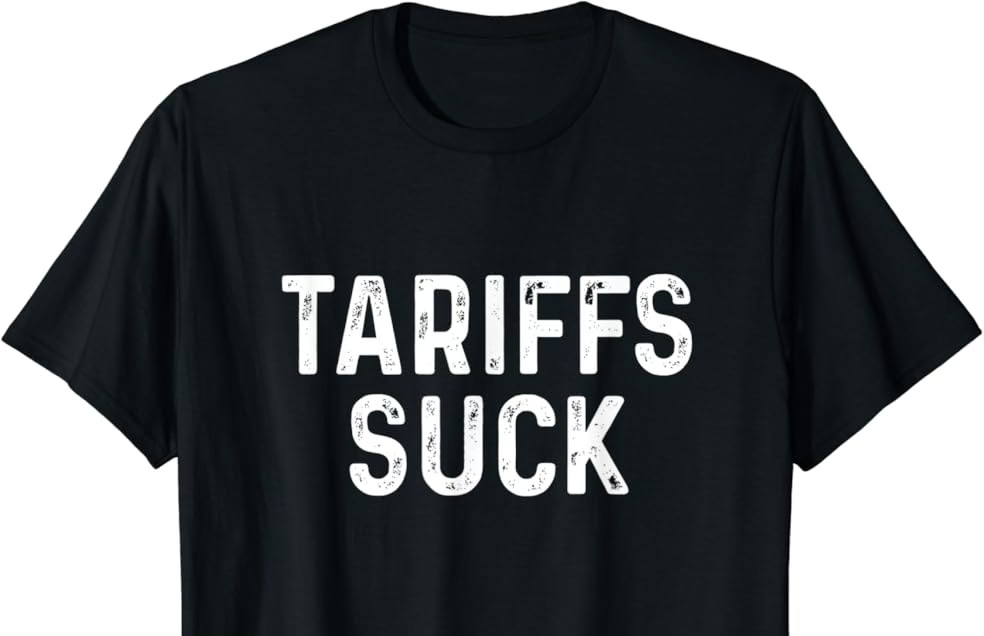Tariffs Suck
I tried to some up with a pithy, New York Post-worthy title for today's bit, but my cleverness only goes so far. So, plain and direct it is.
One of the worst parts of Trumpism lies in how it has undermined traditional economic conservatism/libertarianism. The notion of free markets has become increasingly alien to the dominant subset of today's GOP, with a combination of economic protectionism and and a visceral "punish the other guys" attitude replacing the premise that has worked better than any other in history for elevating living standards and improving economies.
Tariffs are part of a rather strange "bring the jobs home" possessiveness that ignores myriad economic realities. First among them is that jobs do not "belong" to anyone. They are not a commodity to be moved around, but rather a function of human interaction. I want to buy a shirt. Many people want to sell me a shirt. The shirt is the thing that is exchanged for something of value. The job that created the shirt is a by-product of the interaction. In forcing the job to "come home," the coercer introduces economic inefficiency. That is to say, the shirt costs more as a result. That saps wealth and productivity out of the economy.
Before you argue that "if it's made here, the money stays in the country," consider the parallel with minimum wage laws. Minimum wages also introduce inefficiency. They make goods and services more expensive than they would be in a free market, meaning that they sap productivity and drag the economy. And, yes, they kill jobs. The true minimum wage is always zero.
Tariffs are similar destroyers. The other country will suffer some harm from them, but they ultimately burden Americans more via higher prices and reduced variety. In paying more for the shirt, either because it's foreign made and taxed or because the taxes were so high it tipped the scales in favor of domestic producers, and you have less money to spend on other things. Government can impose a tax, but it cannot control who ultimately pays the tax. Tax a corporation and it might have its profits pared somewhat, but the bulk of the tax will be passed on to its customers. Tax an imported product, and no matter if production stays overseas or moves within our borders, the consumers will pay more, meaning that they'll spend less on other things.
Few will recall this, but I do: When Trump announced tariffs in his first term, the stock market stagnated for nearly a year immediately thereafter. And, despite many interventionists' hollow arguments to the contrary, the Smoot-Hawley Tariff Act exacerbated and lengthened the Great Depression.
Sadly, none of this will convince the Trump-favoring Right, because rational and empirical arguments don't usually work against tribalistic and gut-check "fairness" beliefs. We want to believe that in economic transactions there are winners and losers, rather than the win-win reality of voluntary economic interaction. We want to believe that China's economic shenanigans should be punished by taxing them, and that causes us to overlook how it is we who pay the bulk of those taxes.
Worth mentioning is Trump's wacky idea of funding the government via tariffs rather than income taxes. While some have argued that a consumption-based taxation model (see: FairTax) would be better than the current income-based one, limiting that consumption taxation to imports would cause imports to plummet and thus fail to produce anywhere near the desired revenue stream. The math is completely whack on that idea.
But, whack doesn't mean it doesn't sell. Trump is a salesman at heart, and selling to emotion is a tried-and-true tactic that works better than cold numbers. It's why car salesmen always tell you the monthly payment rather than the interest rate and total cost.
Unfortunately, affinity for tariffs is bipartisan. Biden showed no interest in the economic realities of tariffs. For him, they were just another vote-buying stunt, a sop to the unions and his own version of "bring jobs home." Sure, some jobs will come home, but as with the minimum wage, some jobs will simply disappear because the higher costs of the products those jobs create (if it didn't cost more to make domestically, things would not be made overseas) means fewer will be sold or fewer other things will be sold.
Those who think that Trump will rescue the nation from four years of Bidenomics aren't entirely wrong. His way will be less-bad than Biden's, but that's a very low bar. Un-knotting the regulatory mess, pulling back from insane energy policy, and similar "less government" actions will help. But, tariffs are about as stupid a policy as one can imagine, and it doesn't matter whether they are imposed by the Left or the Right.
Want to give China what-for for her shenanigans? Create competitive pressure in international trade. Write bilateral free-trade agreements with "parity," i.e. we access their markets as they access ours, and have nations compete for the greatest access. Market forces will do the rest.



The global capitalist system is far from "free market". That doesn't mean we shouldn't try for that via policy, taxation, etc. - but, as of right now, nobody is a free market economy. Due to this, I view tariffs as a way to prevent a "hot war". It's literally the last thing before a hot war. If you view tariffs as military strategy - vs. purely economic with cause and effects - there is ample justification for them.
Just a quick alert, tried sharing this article on FB and it was immediately removed for "violating community standards". So apparently articles on tariffs or the economy are now considered "offensive". I've requested a review but rarely do I see success in that.